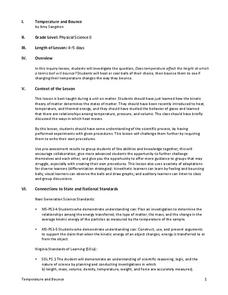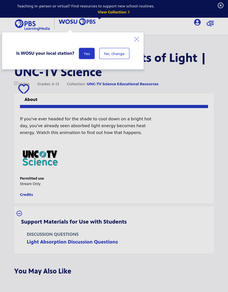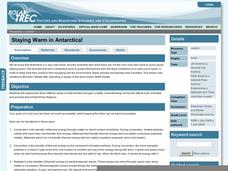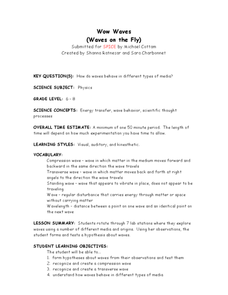Curated OER
Heat Transfer & Phase Changes
In this heat transfer and phase change worksheet, students experiment with ice, salt, and milk to show the relationship between the temperature of a solution and its phase. Students turn milk from a liquid to a solid and graph the...
Curated OER
Science Crossword Puzzles - Energy and Heat Transfer
Determine the answers to 7 clues using vocabulary associated with energy and heat transfer. your class will review physics terms and fill in the puzzle.
Curated OER
Energy from the Sun
In this energy worksheet, students complete a chart on the three types of heat transfer and their causes. Then they explain why all of the radiation directed at Earth does not reach the surface. Students also explain the factors in the...
DiscoverE
Slinky® Science
Toys are great for learning about physics. Scholars use Slinky® toys to study Newton's laws of motion and types of energy. After a little play, they then model longitudinal and transverse waves with the Slinky® toys.
Curated OER
Energy Detectives at Work
Students are "Energy Detectives" working for an engineering firm that does energy evaluations at schools. In teams, they locate energy sources around the school, and record their findings on an Energy Detective Worksheet.
Science 4 Inquiry
Investigating How Heat Flows
It is impossible to cool down a glass of water by adding ice. Young scientists explore heat transfer through videos, experiments, and interactive games. They quickly catch on that the water melts the ice and things aren't always as they...
Curated OER
Three Methods of Heat Transfer
Learners participate in a variety of experiments designed to illustrate types of heat transfer including conduction, convection and radiation. They complete worksheets as an assessment of the experiments.
Curated OER
Olympic Solar Energy
Students use cardboard and aluminum foil to construct a solar oven that concentrates enough sunlight to cook a hotdog. They review the history and use of solar energy in relation to the Olympics.
Curated OER
Fusion Confusion
Students are introduced to three types of energy transfer: conduction, convection, and radiation. They model the scientific process of fusion to become with the sun and how it produces energy.
STEM for Teachers
Temperature and Bounce
Take part in a fun experiment and hold an impromptu bouncing contest with your class. Young scientists heat and cool balls before bouncing them to determine whether temperature changes affect how they bounce. The set of STEM lesson plans...
Curated OER
Energy
In this energy worksheet, students will complete a graphic organizer by filling in the 2 types of energy waves, 6 forms of energy, and 3 ways thermal energy is transferred.
Curated OER
TE Lesson: Using Heat from the Sun
Students examine fossil fuels, nuclear and renewable fuels. They study investigate types of heat transfer such as convection, conduction, and radiation. They complete crossword puzzles based on the vocabulary. They design, construct and...
Curated OER
Move It!
Students observe a demonstration presented by the teacher covering different types of energy. They participate in an experiment where they study numerous physics vocabulary words and visit websites that demonstrate examples of these...
Colorado State University
What Is a "Model"?
Model the transfer of energy during a typical 24-hour period. Young scholars use a game-like approach to learning the patterns of heat transfer through the day and night. Groups of four exchange different tokens as the energy transfers...
Curated OER
Make a Solar Oven
Students build a solar oven. In this Science lesson, students construct a functional solar oven. Students design the oven and explain the energy concepts involved.
Colorado State University
How Does the Earth Cool Itself Off?
Where does all the heat go when the sun goes down? An interesting lesson has learners explore this question by monitoring the infrared radiation emitted over time. They learn that hot spots cool more quickly that cooler spots.
PBS
Light Absorption: Effects of Light | UNC-TV Science
Beat the summer heat by exploring the properties of color. Scientists view a video explaining the relationship between light absorption and energy transfer using variables including intensity, time, and wavelength. A multiple-choice...
Curated OER
Energy Flow and the Food Chain
Learners complete discussions and worksheets about the Hawaiian food chain. In this food chain lesson plan, students research decomposers, consumers, and producers.
Curated OER
Conduction, Convection and Radiation
Sixth graders listen to descriptions of types of heat to gain background knowledge In this heat lesson, 6th graders perform experiments to understand various types of heat transfer (convection, conduction and radiation.) Students assess...
Polar Trec
Staying Warm in Antarctica!
Has your class ever wondered how animals and scientists stay warm in the Polar Regions? Kids will investigate to understand the three types of heat transfer and how heat transfer affects those trying to stay toasty in sub-zero...
Biology Junction
Photosynthesis: Energy and Life
All life requires energy ... and the connection between energy and plant life typically requires photosynthesis. Scholars explore photosynthesis in depth from ATP/ADP through the Calvin cycle. A helpful presentation highlights concepts...
Curated OER
Ice Energy
Students study the concept of ice energy. In this ice energy lesson, students observe what happens when salt is sprinkled on a piece of ice before following a recipe to make two types of ice cream. They note the difference in the two...
Curated OER
Does Cloud Type Affect Rainfall?
Student uses MY NASA DATA to obtain precipitation and cloud type data. They create graphs of data within MY NASA DATA. They compare different cloud types as well as precipitation types. They describe graphs of the precipitation and cloud...
Curated OER
Wow Waves (Waves on the Fly)
Students formulate hypotheses on wave behavior and test them. For this physics lesson, students compare and contrast transverse and compression waves. They determine the wavelength of transverse waves.

























